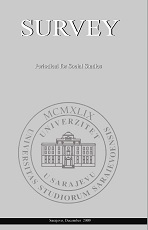History of Bosniak Literature – A Drawing in the Sand?
History of Bosniak Literature – A Drawing in the Sand?
Author(s): Enes DurakovićSubject(s): Literary Texts
Published by: Univerzitet u Sarajevu
Keywords: literary history; literary poetics; the culture of memory; intertextual theory; Bosniak literature; B&H literature; interliterary communities; ethno-cultural identity; literary periodization; orientalism; Eurocentrism; postcolonial criticism;
Summary/Abstract: This work is an introductory study of the Poetical Cultural Narrative of Bosniak Literature project, which analyzes the causes and reasons of revival of the traditional concept of the national literature’s history in the South Slavic cultural space, as well as the possibility for its redefinition through liberation fromthe national-romanticist forms of national spirit’s apotheosis of the sacrosanct ethno-cultural identity. Obsolete models of literary historiography in the South Slavic space appear even today, both due to delays in the theoretical self-reflection conditioned by longstanding ideological repression of soc-realistic practice and because of the absurd competition concerning the seniority of cultural and civilisational continuities as proof of national primacy and indigenousness in this area. The literary and historical paradigm considered in this way will erase all traces of “foreign spirituality”, thus, the geographical topography is transformed into the sanctity of spiritual topography, while historical events become sacral toposes of national existence transcending time. Such forms of cultural and historical narratives have always “fed” themselves on fear and resistance against the Other and have been accompanied by rigid forms of ethnocentric culture based on political ideology of extermination of the Other. A special dimension of this experience of denying identity was seen in the case of the multicultural community of Bosnia and Herzegovina and the Bosniak micro-culture in particular, in the shape of the denial of the B&H and Bosniak literature throughout the entire 20th century. The stigmatization of Bosniaks as traitorous converters, the denial of any cultural and historical particularity on their part as opposed to that of other South Slavic cultural communities, orientalistic stereotypes and xenophobic excommunication of all forms of Islamic spirituality and culture from the sanctified literary culture of the Christian Europe; all this resulted in an enormous corpus of texts, in which the destruction of identity truly carried all features of a preparation for the final settling of accounts with the “hostile Other”. Today, it is undoubtedly vital to renewthe concept of Bosniak literary history; however, such a project should not be reduced to mere illustration of particularities of the ethno-cultural identity, especially not to antagonization towards the parallel and neighboring cultural and historical presences. History and poetics of Bosniak literature can only be established with preference for the particularity of a literary identity’s cultural grammar, the precious uniqueness of a micro-culture which enriches both the B&H and the South Slavic literarymosaic with esthetic values characterized not only by autochthonous features, but also by hybrid and syncretic forms of dynamic intertwining of the “Eastern” and “Western” literary culture.
Journal: SURVEY - Periodical for Social Studies
- Issue Year: 2009
- Issue No: 1
- Page Range: 9-70
- Page Count: 62
- Language: English

